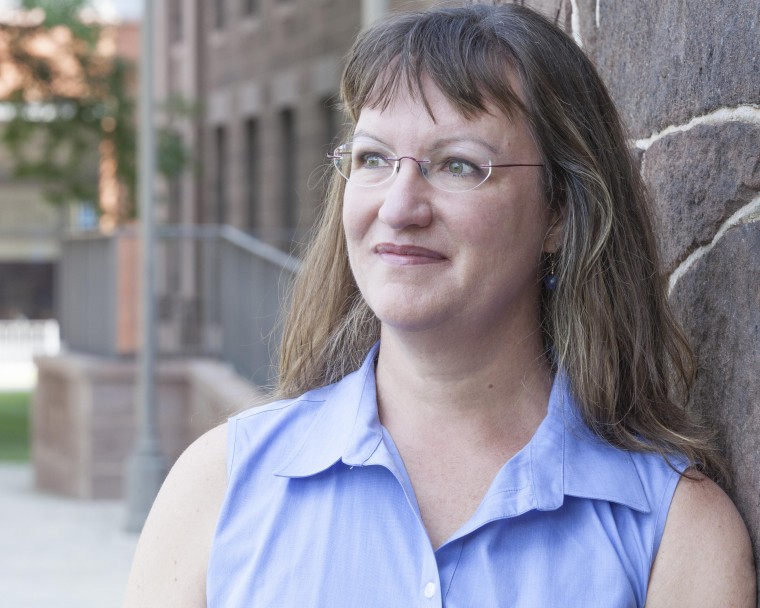McAlister Explores Our Undying Attraction to the Undead

Some trudge, others sprint. Some materialize from otherworldly forces, others from infectious diseases. Some want flesh, others have a more specific taste for brains.
Whatever their individual differences, we know zombies when we see them. And from 1932’s White Zombie to 2023’s The Last of Us, we’ve seen these charismatic, cannibalistic humanoids on the screen a lot through the generations. Off-screen, they’ve seeped into our language. (In the business world, a “zombie” lumbers on the edge of insolvency.) And more broadly, as suggested by a recent conspiracy theory that testing the nation’s emergency broadcast system would trigger an outbreak of ghouls, zombies remain an enduring part of our collective consciousness.
“The zombie is this empty shell, since by definition it has no consciousness. So, it’s an empty human form into which you can pour any set of meanings you like,” said Elizabeth McAlister.
McAlister, a professor of Religion and African American Studies, leads “Theorizing Religion with Zombies,” a popular course that harnesses the zombie as an entry point to a range of themes, from the apocalypse and resurrection to capitalism and race and gender theory. Along the way, the zombie provides insights into our identity. “What is a human,” McAlister said, “and where are those boundaries?”
The word zombie is rooted in several African languages, loosely interpreted to mean a soulless body or a disembodied soul. After French colonists kidnapped enslaved Africans and brought them to work on the sugar and coffee plantations of Haiti (then called Saint-Domingue) beginning in the 17th century, the zombie emerged as a folk representation for the dehumanization inherent in slave labor.
But zombies assumed different meanings for those in power. For slaveholders during the Haitian slave rebellion that began in the late 18th-century, zombies symbolized the threat of revolution out in the fields. For the Americans who later occupied the island—the U.S. Marines’ 19-year occupation of Haiti lasted through 1934—the zombie helped caricature Haitians as savages and, in turn, helped justify the presence of the occupiers.
Travel writer William Seabrook’s 1929 book The Magic Island—which, McAlister noted, features a chapter describing a group of dead men working in cane fields—was key in exporting the idea of the zombie to the rest of the world, just as Hollywood’s early monster-movie canon was taking shape. The first zombie films featured fictionalized Caribbean islands and heavily racist depictions of the Afro-Haitian religion known as Vodou, reflecting white Americans’ projections onto Black people, McAlister said.
A few decades later, director George Romero’s 1968 film Night of the Living Dead played against those racial tropes in telling a story of a group of strangers barricaded in a farmhouse as hordes of flesh-eating monsters find their way to their door. In portraying the Black protagonist as a complex, capable leader who’s dismissed by his white peers at their peril, the film hinted at zombies’ capaciousness. It was an inflection point: McAlister informally categorizes zombie films as pre-Romero and post-Romero.
Since then, zombies have become vehicles for a range of themes—consumerism and neoliberal capitalism, immigration, refugees, and climate collapse—that reflect prevailing moods and anxieties of their given moment. (There are fitness classes tailored to surviving a zombie apocalypse, McAlister noted.) Among the most durable ideas embodied in the zombie are contagion and infection, themes which have gained new resonance since 2020.
“The pandemic lends itself to thinking about zombies,” McAlister said, citing the book Contagious: Cultures, Carriers and the Outbreak Narrative by Priscilla Wald and its analysis of “outbreak narratives” of viruses from the Global South working their way into the Europe and America. The class also reads an article by American Studies professor Megan Glick on zombies and Ebola, and McAlister’s own writings on the Zombie. “It certainly hit closer to home for the students, and for me, that we’ve been through COVID, and we’re reading and watching films about contagious disease that spreads quickly and either decimates or transforms the population.”
Whatever unfolds, the zombie is a tool perennially available for helping us make sense of it. “The zombie takes a human form, yet it’s evacuated of its identity and its humanity—it can stand in for human, but also not-human,” said McAlister, who expanded upon the history of zombies in an interview with NPR’s Throughline. “That allows us to play around intellectually with any number of different theoretical models.”

